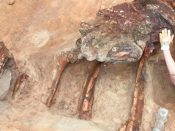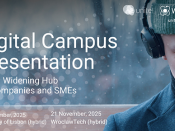Por Miguel Teixeira (Departamento de Engenharia Mecânica, Faculdade de Engenharia, Universidade do Porto, Portugal).
In turbulent free shear flows such as jets and wakes, and also in turbulent boundary layers, the turbulent region is bounded by an interface (the turbulent-non-turbulent interface layer, or TNTI) separating it from a non-turbulent region where the magnitude of the potential velocity fluctuations can still be high, but decays with distance from the TNTI. This spatial decay rate generally follows a power law, which can be traced directly to the behaviour of the kinetic energy spectrum of the turbulence at low wavenumbers, as shown originally by Phillips (1955), Proc. Camb. Phil. Soc. Phillips showed that the spatial decay of the velocity variances in the non-turbulent region varies as z^(-4), where z is distance to the TNTI, for a turbulence energy spectrum that behaves as k^4 at low wavenumbers, but did not show why this spatial decay rate only depends on the low wavenumber range of the spectrum.
In this presentation, it will be shown how Rapid Distortion Theory (RDT) can be used to generalize Phillips's result to a situation in which the energy spectrum of the turbulence has a low wavenumber range that is proportional to k^n, where n is an integer, and to understand why the spatial decay rate of the velocity variances in the non-turbulent flow region only depends on the low wavenumber range. It is shown quantitatively that, when n=1, the velocity variances decay as z^(-2), when n=2, they decay as z^(-3), when n=4 or n>4, the velocity variances decay as z^(-4), and when n=3, they decay as log(z)*z^(-4). These theoretical results are confirmed by direct numerical simulations (DNS) of turbulent fronts evolving into an irrotational flow region in the absence of mean shear, using conditional averaging techniques.





















